
Peter Brötzmann was a German jazz saxophonist and clarinetist regarded as a central and pioneering figure in European free jazz. Throughout his career, he released over fifty albums as a bandleader. Amongst his many collaborators were key figures in free jazz, including Derek Bailey, Anthony Braxton and Cecil Taylor, as well as experimental musicians such as Keiji Haino and Charles Hayward. His 1968 Machine Gun became "one of the landmark albums of 20th-century free jazz".

Evan Shaw Parker is a British tenor and soprano saxophone player who plays free improvisation.
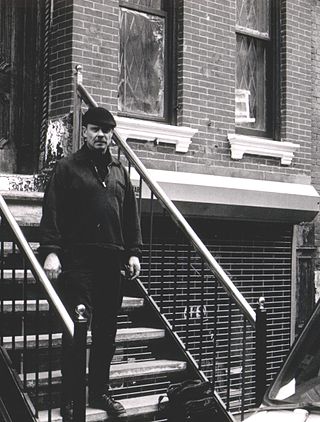
Peter Kowald was a German free jazz and free improvising double bassist and tubist.
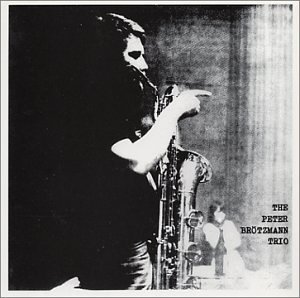
For Adolphe Sax is the debut album by free jazz saxophonist Peter Brötzmann. It was initially released on Brötzmann's Brö label in 1967, and was reissued on LP by FMP in 1972. In 2002, it was reissued, with an additional track, on CD by the Atavistic label, and in 2014, the original three tracks were reissued on CD by Cien Fuegos Records.
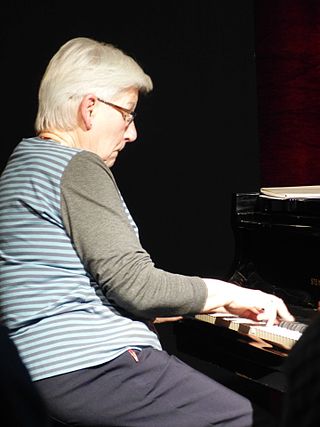
Irène Schweizer is a Swiss jazz and free improvising pianist. She was born in Schaffhausen, Switzerland.

Machine Gun is the second album by German avant-garde jazz saxophonist Peter Brötzmann, originally released on his BRÖ label in 1968.
The Globe Unity Orchestra is a free jazz ensemble.
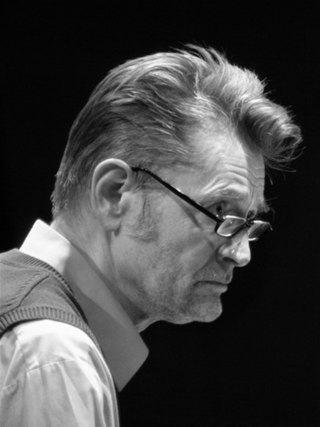
Alexander von Schlippenbach is a German jazz pianist and composer. He came to prominence in the 1960s playing free jazz in a trio with saxophonist Evan Parker and drummer Paul Lovens, and as a member of the Globe Unity Orchestra. Since the 1980s, Von Schlippenbach has explored the work of more traditional jazz composers such as Jelly Roll Morton or Thelonious Monk.

Manfred Schoof is a German jazz trumpeter.

Gerhard Rochus "Gerd" Dudek was a German jazz tenor and soprano saxophonist, clarinetist and flautist.

Buschi Niebergall was a German free jazz musician. His given name was Hans-Helmut, and late in life, his friends called him Johannes.

Alms/Tiergarten (Spree) is a live album by Cecil Taylor with the Cecil Taylor European Orchestra recorded in Berlin on July 2, 1988, as part of month-long series of concerts by Taylor and released on the FMP label.
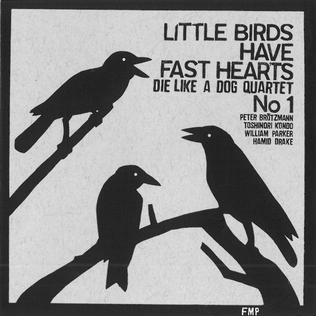
Little Birds Have Fast Hearts, Nos. 1 and 2, is a pair of live albums by the Die Like a Dog Quartet: saxophonist Peter Brötzmann, trumpeter Toshinori Kondo, bassist William Parker, and drummer Hamid Drake. The albums were recorded in November 1997 at the 30th "Total Music Meeting" held at the Podewil in Berlin, and were released in 1998 and 1999 by FMP.

Aoyama Crows is a live album by the Die Like a Dog Quartet: saxophonist Peter Brötzmann, trumpeter Toshinori Kondo, bassist William Parker, and drummer Hamid Drake. It was recorded in November 1999 at the "Total Music Meeting" held at the Podewil in Berlin, and was released in 2002 by FMP.
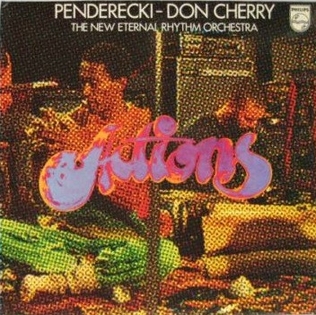
Actions is a live album featuring debut performances of works by composer Krzysztof Penderecki and trumpeter and composer Don Cherry. It was recorded on October 17, 1971, at the Donaueschingen Festival in Donaueschingen, Germany, and was released on LP later that year by Philips. The music was performed by an ensemble called The New Eternal Rhythm Orchestra, composed of top European improvisors. In 1998, the album was reissued on CD by Transparency Records. It was remastered and reissued again in 2001 by Intuition Records.
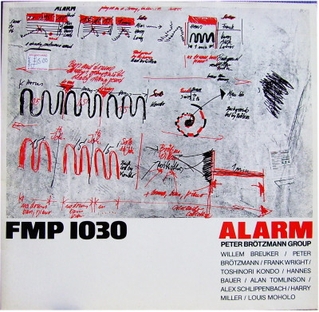
Alarm is a live album by saxophonist Peter Brötzmann. It was recorded on November 12, 1981, at NDR Studio 10 in Hamburg, Germany, during the 164th NDR-Jazzworkshop, and was released in 1983 by FMP/Free Music Production. On the album, Brötzmann is joined by saxophonists Willem Breuker and Frank Wright, trumpeter Toshinori Kondo, trombonists Hannes Bauer and Alan Tomlinson, pianist Alexander von Schlippenbach, bassist Harry Miller, and drummer Louis Moholo. In 2006, the album was reissued on CD by Atavistic Records as part of their Unheard Music Series.
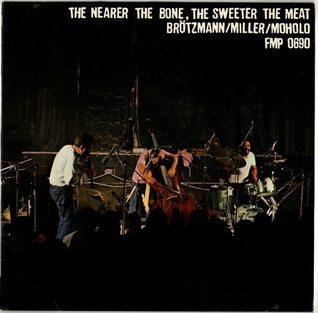
The Nearer the Bone, the Sweeter the Meat is an album by saxophonist Peter Brötzmann, double bassist Harry Miller, and drummer Louis Moholo. It was recorded on August 27, 1979, at FMP Studio in Berlin, and was released on vinyl later that year by FMP/Free Music Production. In 2012, the album was reissued on CD by the Cien Fuegos imprint of Trost Records.

Opened, But Hardly Touched is a live album by saxophonist Peter Brötzmann, double bassist Harry Miller, and drummer Louis Moholo. It was recorded on November 5 and 6, 1980, at the Flöz in Berlin, and was released on vinyl as a two-album set in 1981 by FMP/Free Music Production. In 2014, the album was reissued on CD by the Cien Fuegos imprint of Trost Records.
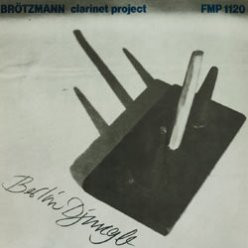
Berlin Djungle is a live album by the Brötzmann Clarinet Project, led by Peter Brötzmann, and featuring an eleven-piece band that was assembled for a concert at JazzFest Berlin. Documenting a performance of a single 47-minute work, it was recorded on November 4, 1984, at the Delphi Theater in Berlin, and was released on vinyl in 1987 by FMP/Free Music Production. In 2004, it was reissued on CD by Atavistic Records as part of their Unheard Music Series. On the album, Brötzmann is joined by clarinetists Tony Coe, J.D. Parran, Ernst-Ludwig Petrowsky, Louis Sclavis, and John Zorn, trumpeter Toshinori Kondo, trombonists Alan Tomlinson and Johannes Bauer, double bassist William Parker, and drummer Tony Oxley.

3 Points and a Mountain is a live album by saxophonist Peter Brötzmann, pianist Misha Mengelberg, and percussionist Han Bennink. It was recorded on February 26, 1979, at the Akademie der Kunste in Berlin, and was initially released on vinyl later that year by the FMP label. In 2000, FMP reissued the album on CD, with previously unreleased tracks, under the title 3 Points and a Mountain... Plus, and, in 2022, it was reissued on vinyl by the Cien Fuegos imprint of Trost Records.




















